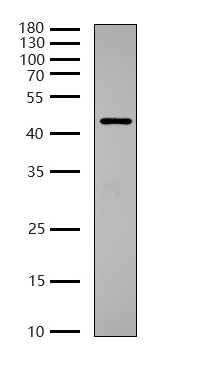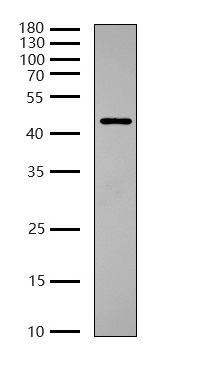TGFB1 antibody
Catalog Number:
- 产品信息
- 相关图片
- 常见问题
|
Basic infomation |
source |
Mouse |
|
Clonality |
Polyclonal |
|
|
Isotype |
IgG |
|
|
Reactivity |
H M R |
|
|
MW (kDa) |
44kDa |
|
|
Purification |
Antigen affinity purfication |
|
|
UniProt ID |
P01137 |
|
|
NCBI Gene |
7040 |
|
|
|
|
|
|
Applications |
Tested Applications |
WB, |
|
Cited Applications |
WB, IHC, IF |
|
|
Product Usage Information |
Western Blotting |
1:500-1:2000 |
|
Immunohistochemistry |
1:200-1:400 |
|
|
Immunofluorescence |
1:200-1:400 |
|
|
|
|
|
|
Storage |
PBS with 50% glycerol and less than 0.02% sodium azide |
|
|
Store at –20°C, stable for one year after shipment |
||
|
Do not aliquot the antibody |
||
|
|
||
|
Background |
This gene encodes a secreted ligand of the TGF-beta (transforming growth factor-beta) superfamily of proteins. Ligands of this family bind various TGF-beta receptors leading to recruitment and activation of SMAD family transcription factors that regulate gene expression. The encoded preproprotein is proteolytically processed to generate a latency-associated peptide (LAP) and a mature peptide, and is found in either a latent form composed of a mature peptide homodimer, a LAP homodimer, and a latent TGF-beta binding protein, or in an active form consisting solely of the mature peptide homodimer. The mature peptide may also form heterodimers with other TGFB family members. This encoded protein regulates cell proliferation, differentiation and growth, and can modulate expression and activation of other growth factors including interferon gamma and tumor necrosis factor alpha. This gene is frequently upregulated in tumor cells, and mutations in this gene result in Camurati-Engelmann disease. |
|
|
|
|
|
|
Abbreviation |
H: human M: mouse R: rat Rb: rabbit Hm: hamster Mk: monkey Vir: virus C: chicken Z: zebrafish Dg: dog Pg: pig Hr: horse |
|



 返回列表
返回列表